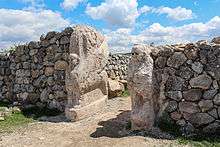Bogazkale
Boğazkale is a village in the Central Karadeniz region in Turkey. It lies next to the ruins of the ancient Hittite city of Hattusa (Turkish: Hattuşaş), a UNESCO World Heritage site.
Get in
Boğazkale is off the Ankara - Samsun road from the town of Sungurlu and there are plenty of buses that run on that route.
There are 2 municipal buses per day from Sungurlu to Boğazkale from Monday to Friday. The bus leaves Sungurlu at 07:30 and 17:30. The return trips from Boğazkale are at 07:00 and 17:00. Ask the locals for Belediye otobüsü Boğazkale at Sungurlu. There are 1-2 dolmuş services per day without a reliable timetable. Taxis are also available between Sungurlu and Boğazkale.
Get around
See

- Hattusa, the ruins of a Hittite city dating from about 2000 BC to 1000 BC. At one time it must have been a great and impressive city but today little remains except for the reconstructed foundations. However, the plan of the city is still evident and walking around the ruins makes an interesting and instructive day.
- Boğazköy Museum A few objects from Hattusa (most are in Ankara) and lots of photographs of the excavations.
- Yazılıkaya An excavation site containing Hittite buildings. The foundations of large religious buildings from that period are still visible.
Do
Buy
Eat
Drink
Sleep
- 🌍 Hotel Aşıkoğlu, ☎ +90 364 452 2004. The first hotel founded in Boğazkale with a very helpful owner who can organize pickups from Sungurlu and also trips to the surroundings like Alacahöyük. 150 TL for a single room.
- 🌍 Hittite Houses, ☎ +90 533 517 43 96. The budget accommodation of the Hotel Aşıkogluç just on the other side of the street. You have access to all services of Hotel Aşıkoğlu with transfers etc. 80 TL for a single room.
- Hattusas pension, ☎ +90 364 452 2013. The pension has a few rooms with shared bathroom and a restaurant on the ground floor. Run by Mustafa and Ahmet Baykal, the friendly owners, who are only to happy to chat and give advice. US$7-15.
Stay safe
Boğazkale squarely lies within the habitat of the ticks (kene), which are known to be a vector of the serious Crimean-Congo hemorrhagic fever (CCHF, Turkish: Kırım Kongo Kanamalı Ateşi or KKKA) in the area. Follow the usual tick prevention strategy of avoiding long grasses and wearing long trouses April through October when the ticks are active; if you nevertheless get bitten by one, seek medical help immediately, as those unfortunate enough to be infected by CCHF have a mortality rate of 10-40% within three days of infection. Experts advice against removing the tick from your body as this may result in its mouth breaking apart — which results in an elevated likelihood for infection and makes it harder for the medical staff to identify the tick.
Go next
- Amasya — inland town on Yeşilırmak River with whitewashed Ottoman architecture and ancient tombs engraved on cliffs overlooking the town.
- Çorum - N 30 km.
- Ordu — on the way to more popular cities and sites of eternally rainy and green Eastern Black Sea.
- Samsun — largest city on the Turkish Black Sea coast with big city attractions: such as opera and museums. Also many sports, including wakeboarding in summer.
- Tokat